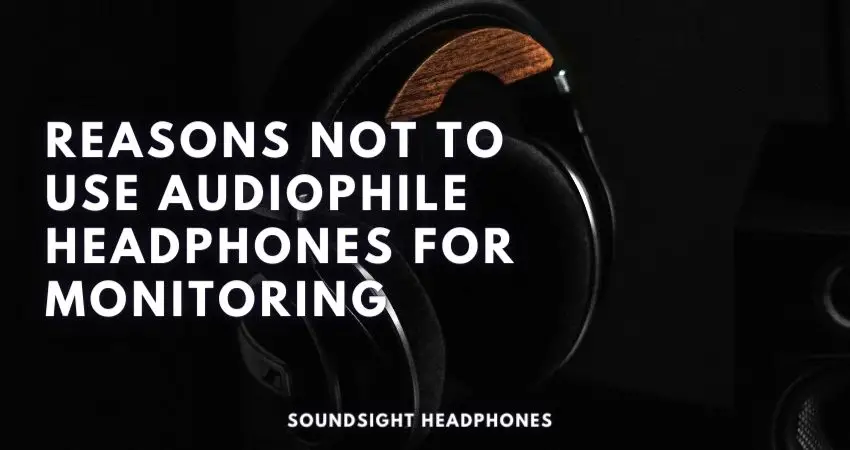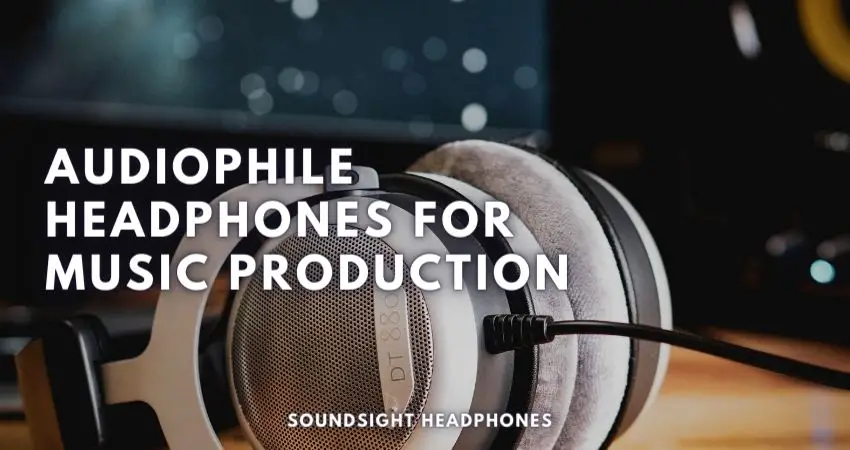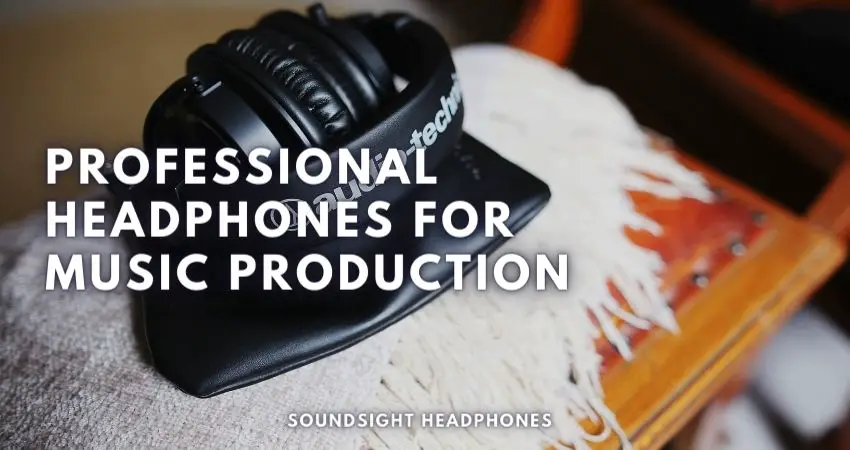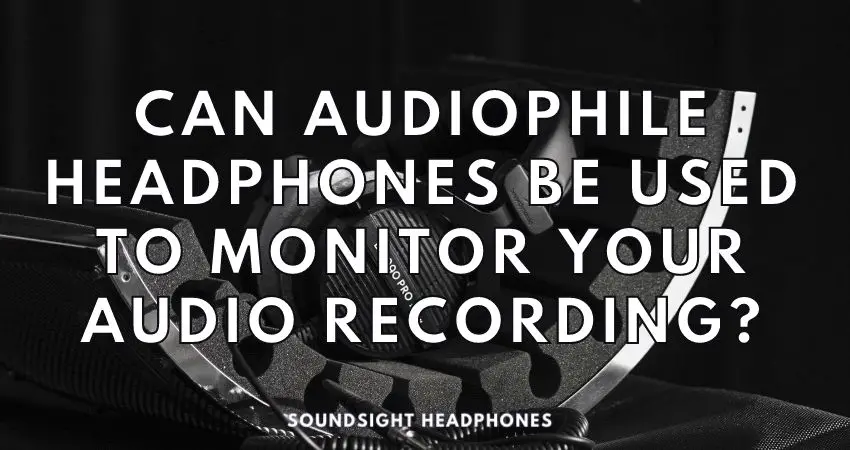Introduction
Audiophile headphones are a specialized set of headphones for enthusiasts who want the best in audio reproduction. Yet, audio engineers only use professional studio headphones or reference headphones. Using the wrong headphones jeopardizes the ability to record, listen, mix and master their music accurately! But does this mean you can’t use audiophile headphones for music production, monitoring, critical listening, or other studio-related tasks? Not necessarily.
In this article, I explain why audiophile headphones in general, and some in particular, are not suitable for recording audio or producing music, while other audiophile headphones are. I’ll also highlight what you should be looking for when purchasing audiophile and reference headphones and provide a list of models that have been used successfully by fellow audio engineers in the past.
Using audiophile headphones as studio headphones—Is it possible?
Yes, you can use some audiophile headphones as studio headphones to monitor your tracks or record music with great success.
You can’t use any pair of closed-back audiophile headphones to record music, track vocals, overdub, use as a reference headphone, or do podcasts, and often times it’s not reasonable to do so.
Often, the two types of headphones cross paths. The audiophile headphones are used as studio headphones and professional monitoring headphones for listening to music at home.
When to use an audiophile headphone as a recording headphone
For music production and recording, it’s not practical to use a pair of open-back or closed-back audiophile headphones. These are expensive, heavy, have a colorful sound signature, and are not portable.
Headphones used for recording audio and critical listening must have the necessary technical and sonic characteristics to accurately represent what is heard in real-time during the recording process.
It is important to note that not all audiophile headphones are flat, neutral, and cheap to use as recording headphones.
The basic requirements of audiophile headphones for recording
For an audiophile headphone or high-fidelity headphone to be helpful as a recording studio headphone, it must fulfill the following requirements:
- Have a flat, frequency response
- An accurate sound response with revealing sound details
- It must not be colored in the lower end of the sound spectrum
- Lightweight, comfortable, and easy to carry
- Sturdy and well-built, but also reasonably priced
- Multiple cables of varying lengths for versatility

4 Reasons why you cannot use audiophile headphones in professional recording studios
Audiophile headphones are heavy & uncomfortable during long recording sessions
Audiophile headphones for everyday listening are pretty heavy. They have a terrific build with quality components, but often weigh in at over 300–500 grams.
Some of them are lightweight, like Grado’s Prestige series or Audio-Technica ATH-WP900. But their colorful sound signature makes them inadequate for studio recording.
Audiophile headphones are not flat, neutral & always accurate
Even when you do find comfortable headphones, neutral audiophile headphones for music production like the Beyerdynamic T5 (third generation) are hard to find without paying a hefty price tag of several hundred dollars.
Some audiophile headphones have a sound response curve close to what audio engineers and producers prefer. Still, they are either expensive, the sound signature is a bit off, or have low impedance and are prone to distortion.
For example, the Denon AH-D5200 is favored by audiophiles but not as popular with professional audio engineers.
Sound tuned for enjoyable music listening, not music production
Audiophile headphones are tuned to provide a pleasant listening experience, while studio headphones are intended for professional use. Audiophile headphones may have excellent tonal balance and be smooth and clean, but they accentuate certain frequencies to give a more appealing sound. These are the exact sound characteristics that audio engineers don’t need when recording and tracking.
The Shure SRH-1540 is an audiophile headphone with an exceptional sonic extension, deep bass, and well-developed highs. Still, the bass response is inconsistent, bloated, and sometimes loose, making recording music impractical.
They’re costly and don’t make sense for professional studios
The last reason audiophile headphones cannot be used as studio headphones is their price compared to studio headphones. Audiophile headphones are expensive and do not offer the technical and analytical sound needed for professional studio applications at a reasonable price like studio headphones. Very few audiophile headphones are comfortable for long periods, have accurate sound, are not colored, and are cheap.
Recording studio headphones are not expensive and should not be a significant part of your studio budget. A good pair of headphones for studio use can be purchased in the $150 to $300 range. So far, spending $300 to $500 on a pair of audiophile cans that meet all the criteria of studio headphones is unreasonable.
Can I use an entry-level audiophile headphone to produce music?
While there are many good-sounding entry-level audiophile headphones available, the ones useful to audio engineers are either expensive or not as effective as proper studio headphones. If you want to get an affordable pair of high-fidelity headphones to enjoy music and occasionally produce music, they should meet the same requirements as any studio headphones.
However, if you record your own music as a hobby, the requirements aren’t so strict, and a set of entry-level audiophile cans can do the trick. Check out entry-level audiophile models in the $300 to $500 price range, as they offer excellent value and a balance of detailed sound and comfortable fit.
Headphones you can use for music production
This section presents a few professional studio headphones and high-fidelity audiophile headphones that you can use or adapt for music production and critical listening.

Audiophile headphones
ATH-A2000Z
The ATH-A2000Z is the ultimate closed-back audiophile headphone for the sound engineer and studio applications. It has 10 feet long fixed cable, rugged construction, supreme comfort via wing headband, and the most enormous soundstage in a closed headphone with accurate imaging and detailed sound. Additionally, the ATH-A2000Z has excellent isolation, no sound leakage, and is lighter than most audiophile headphones, allowing for hours of comfortable wearing.
A Reddit user rated the headphones as “… Monitoring headphones on steroids, it can unveil each and every detail in the mix, but at the same time, you wouldn’t feel like it is murdering your ears.”
Sadly, these headphones are discontinued on the official website, but if you have the opportunity to buy them, don’t hesitate.
Beyerdynamic T5 (3rd gen)
In a previous review of the finest closed-back audiophile headphones under $1000, the Beyerdynamic T5 (3rd Gen) presented a set of features and sonic qualities that make it a fantastic choice for critical listening. The T5 (3rd Gen) is superbly built, reproduces music accurately, and sounds organic, transparent, and revealing. It’s comfortable even after hours of recording, and unlike some Beyerdynamic professional studio headphones, it has detachable cables and low impedance.
Sennheiser HD 660 S
For mixing and mastering engineers, there’s the Sennheiser HD 660 S: fantastic open-back audiophile headphones with solid construction and neutral frequency response. The HD 660 S is the only affordable headphone that offers enough comfort for long hours of mixing and mastering in the studio. It weighs 260 grams and offers a wide frequency range from 10 Hz to 41,000 Hz, accurate sound reproduction, low distortion, impeccable imaging, and instrumental separation. It is more challenging to power than most audiophile headphones and requires a headphone amplifier, but the trade-offs are worth it.

Professional studio headphones
Audio-Technica ATH-M70X
In a comparison of Audio-Technica’s M series studio headphones, I found the M70X to be the best professional monitoring headphones for recording. These headphones are not as popular as the ATH-M50X (Check review), but they offer a highly revealing studio-grade sound, with a neutral, accurate sound response and no coloration. It’s comfortable and lightweight at 9.9 ounces (280 grams), has several detachable cables and is built like a tank.
Beyerdynamic DT 770 Pro
The Beyerdynamic DT 770 Pro studio headphones offer a high level of comfort and sound definition at a reasonable price of less than $150. Aside from the fixed cable, the DT 770 Pro is perfect for studio-related applications, featuring a robust and professional design with good passive insulation and accurate spatial reproduction. They’re the most reliable pair of closed-back recording headphones in the industry.
It has a bright/analytical sound signature, large round earpads that are soft and comfortable, and a lightweight design perfect for extended studio sessions. The DT 770 Pro headphones are popular among professional recording engineers and artists, and they don’t break the bank either.
FAQ
Are audiophile headphones necessary for recording?
Audiophile headphones are not required in the music recording or mixing/mastering tracks. They’re designed for listening and enjoying music, not monitoring, as it provides a more exciting and captivating experience than you would get with studio monitoring headphones.
What audiophile headphones I cannot use for music production?
Audiophile headphones that are too colorful, lack detail, are inaccurate or inconsistent, are too heavy, or do not have long cables to move around the studio are not suitable for music production. Therefore, they cannot be adequately used to produce music.
Here are some examples of hi-fi audiophile headphones that you cannot use in the studio: Audeze LCD-2 Classic Closed, Beyerdynamic DT 1770 Pro, Shure SRH-1540, Focal Celestee, Denon AH-D7200, any wireless audiophile headphones like Focal Listen Wireless or Beyerdynamic Amiron Wireless
Conclusion
The number of people who don’t know whether you can use audiophile headphones for studio applications like recording and monitoring is way too large. The assumption is that because they are musical devices and reproduce music with high fidelity, they are perfect in a professional studio environment. But that’s not always the case.
Now that you know that using high-fidelity audiophile headphones is not the most intuitive and productive way to produce music, you can start looking for professional studio headphones. If you don’t know where to start, you can check out my buying guides for the best studio headphones.
